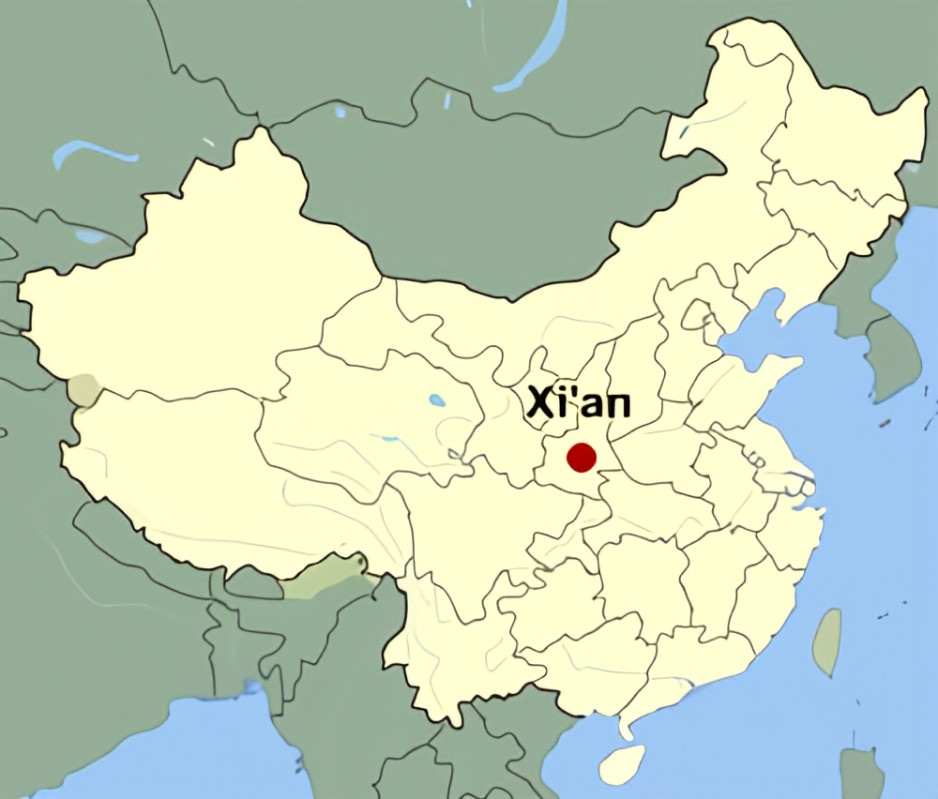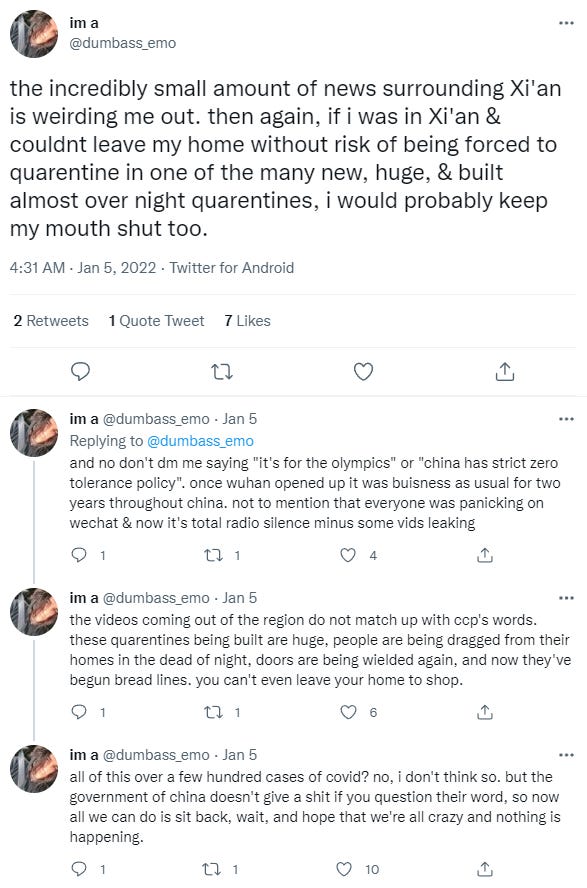CCP actin’ sus.
NOTE: This post was originally published at my Substack. The footnote links go there instead of to the bottom of the page.

I started following the covid outbreak in Wuhan, China during the last week of December, 2019, and I was pretty sure it was going to break out of China by the first week of January, 2020. I was the first among my friends to start talking about covid… but I talked about it only privately—and too late. I was shy, because it was well-known that covid was a conspiracy theory, that conspicuously worrying about it was anti-Asian racism, and that the flu was a much bigger threat.
My first (private) Facebook post about covid was on January 27th, 2020. (I suggested calmly stocking up on water and dry goods, Just In Case.) By that time, we had known about human-to-human transmission for nearly two weeks.1 I should have called for border closures then. By the time January 27th rolled around, it was too late: covid began spreading freely in the Seattle area during the week of January 13th (though we would not realize that until March). But, still shy of being seen as a nut, I wouldn’t write publicly about covid until February 25th and my first actual blog about it was on March 5th. Sure, weeks ahead of the general panic—but still weeks behind the moment when decisive action could (should) have been taken. At the very least, I should have publicly defended the Trump Administration’s restrictions on Chinese travel (imposed January 31st) and demanded more. I’ve always felt a bit bad about that.
So this post is me erring on the side of sharing my thoughts early instead of sitting on them until I’m certain. It’s the first week of January again. I’ve been loosely following Xi’an since Christmas, when the Chinese city of 13 million entered hard lockdown.
This lockdown is really hard, dear reader. China hard. China routinely does lockdowns the likes of which the West can only dream (I mentioned some a couple weeks ago), but the Xi’an lockdown is a step beyond that.
That’s a “huh.” But not a big “huh.” I wrote just a couple weeks ago about how intense Chinese lockdown culture has been, as part of their public health theatrics about suppressing Delta and Omicron.
Then I started hearing the rumor. This is just a rumor, and I have absolutely no concrete evidence for it. No mainstream outlet has reported it even as “rumor”, at least to my knowledge. But, when you’re dealing with a dictatorship, it’s smart to keep your ears pricked up for rumors, and smart to remember that the media conglomerates have both legitimate difficulties investigating the rumors and incentives not to.
The rumor is that Xi’an isn’t being locked down because of a covid outbreak. That’s a cover story, according to the rumor. What’s actually happening in Xi’an (says the rumor) is widespread human-to-human transmission of hemorrhagic fever. This is why the lockdown is more intense than an average Chinese covid lockdown, the rumor mill reports: China is actually trying to keep a new pandemic threat from breaking out.
On the one hand, some viruses that cause hemorrhagic fever come with relatively mild disease. On the other hand, the scariest diseases you’ve ever heard of—Ebola, Marburg—are viral hemorrhagic fevers.
We do know that there’s some hemorrhagic fever in Xi’an, because, to the Chinese government’s credit, they admitted it. They also claim that there is no human-to-human transmission, and that this is just a seasonal outbreak of hantavirus (which is terrifying, but such outbreaks do happen in this part of China). Of course, we’d be idiots to take these reassurances at face value…

…but we’d also be idiots if we completely dismissed this simple (and simplest) explanation for what’s going on in Xi’an just because the Chinese Communist Party reported it. The fact is, even in a dictatorship, the great majority of rumors are false. Most conspiracy theories, even the plausible ones, aren’t true. China says the extra-hard lockdown is because of the Olympics coming up. That doesn’t sound crazy to me!
Still, two “huhs” from me. I’ve started looking up “Xi’an” and “hemorrhagic” regularly on Twitter, just to see what’s new or leaking. Half the people talking about it are anti-vaxx conspiracy theorists. That is normal and expected when you are dealing with the fringe of Known Reality. Half the people talking about an imminent coronavirus pandemic in January 2020 were conspiracy theorists of various stripes, too.
Today’s piece of new information was unsettling, and led me to write this post:
Police jail dozens for resisting, complaining about Xi’an lockdown
Police in the northern Chinese city of Xi’an have arrested dozens of people for spreading “rumors” online after the authorities banned the city’s 13 million residents from posting negative reports from coronavirus lockdown. At the same time, a string of other arrests suggests growing public anger over restrictions that have left many without access to adequate food, daily necessities and urgent medical care.
Song Wentao, a high-ranking official with the All-China Federation of Returned Overseas Chinese, was fired after posting critical comments about the harshness of Xi’an’s lockdown.
Meanwhile, the Xi’an branch of the Cyberspace Administration said it had jailed one social media user for 10 days and was currently investigating “multiple online violations linked to libel and rumor-mongering,” the ruling Chinese Communist Party (CCP)’s law enforcement website Chang’an reported.
“The Xi’an Cyberspace Administration … is working with law enforcement … to intensively investigate and deal with online violations such as fabricating rumors, inciting regional discrimination and insulting others,” the report said, citing the case of a man surnamed Luo who was sentenced to 10 days’ administrative detention for “maliciously fabricating false information” and “libeling disease prevention personnel” in his friends group on social media.
Two years ago today, I was reading stories about CCP apparatchiks shutting down “rumors” in Wuhan province—citizen journalism that all turned out to be true, and which I should have trusted more at the time. Their heavy-handed suppression of dissent in Xi’an—specifically Xi’an, too; I didn’t see stuff like this when Zhangjiajie locked down—raises an eyebrow, and feels chillingly familiar. The Chinese Communist Party is certainly hiding something.
However, there are lots of possible reasons why the CCP might be blacking out discussion of the Xi’an lockdown, and only one of them is “they’re hiding Ebola 2: Shaanxi Boogaloo.” The most obvious non-threatening explanation is that the CCP is just covering up its own corruption and incompetence. That’s CNN’s angle on it right now, and, hey, fair enough.
I think the probability that the rumor of widespread person-to-person transmission of hemorrhagic fever in Xi’an is actually true is still less than 15%. We had stronger reasons to be afraid of the Chinese coronavirus2 by this time in 2020, and it’s likely that my decision to post about Xi’an so early is an overcorrection of my past errors. Most rumors peter out after a little while, and there’s probably nothing going on Xi’an that we in America need to worry about. You will probably get to watch this rumor peter out as well.
Still. Keep an eye on Xi’an. It’s never a bad idea to have your basement stocked up with food and water according to the Ready.gov guidelines. I’ve said that before and surely will again.
Also, it is probably a good time—yes, now—for President Biden to impose strict, enforced quarantines on all incoming travel from anywhere in China. If that is impossible or impractical, then, alternatively, we should suspend all passenger traffic between the U.S. and China until four weeks after Xi’an’s lockdown ends. In early pandemic control, you must act quickly and err on the side of overreaction, because, by the time you have enough information to know that you should have closed your borders in January, it’s already March and containment is impossible. And it’s not like we can trust the CCP’s reassurances that all is well. We tried that in 2020.
Well, I say “we.” But, of course, the Chinese knew about human-to-human transmission weeks before we did. And the World Health Organization, kowtowing to Chinese denials, refused to admit human-to-human transmission until January 21st.
The name “covid-19” would not be chosen until late January, so “Chinese coronavirus” was all we had. Though I still think “Kung Flu” was the funniest candidate.
